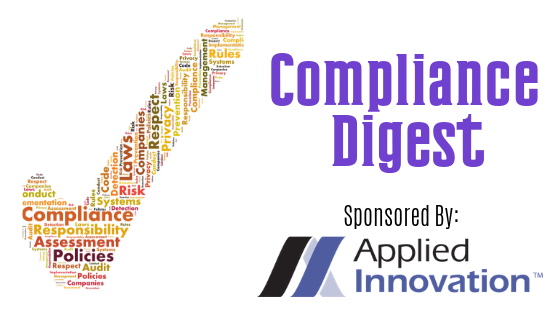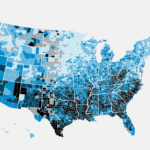Every week, AccountsRecovery.net brings you the most important news in the industry. But, with compliance-related articles, context is king. That’s why the brightest and most knowledgable compliance experts are sought to offer their perspectives and insights into the most important news of the day. Read on to hear what the experts have to say this week.
I’m thrilled to announce that Applied Innovation has signed on to be the new sponsor of the ARM Compliance Digest. Utilizing over 50 years’ experience in the collections industry and over 75 in technology, Applied Innovation is helping to shape the future of accounts receivable management.
Appeals Court Upholds Not Granting Extension Over Appeal That Was Filed 16 Minutes Late
The Tenth Circuit Court of Appeals has upheld a lower court’s decision to deny a plaintiff’s attorney’s appeal for filing a motion to extend the deadline to file a notice of appeal because it was submitted 16 minutes late and dismissed another case involving the plaintiff for a lack of jurisdiction because it is untimely. More details here.

WHAT THIS MEANS, FROM MICHAEL KLUTHO OF BASSFORD REMELE: Time waits for no one . . . ! Plaintiff lost an FDCPA case. Plaintiff wanted more time to appeal so she attempted to electronically file a motion for an extension of the time to appeal. The 10th Circuit denied the motion to extend. Why? Plaintiff’s request was electronically filed just 16 minutes after the deadline to do so had expired. Plaintiff’s counsel then appealed that decision arguing that she had tried logging in to file the motion, but logged into the wrong website. Time, meanwhile, ticked ever forward. Until it was too late. The Court was not swayed.
In denying the motion to allow the tardy appeal to proceed, the Court wrote that the excuse proffered — the wrong website address had been entered when logging in to file the motion (at the last minute) — is no different than typing in the wrong street address into one’s GPS and then ending up at the wrong physical location (i.e., not the Courthouse), minutes before the actual Courthouse, in another part of the City, is about to close. Another very curious aspect of this case, on an entirely different note, was the fact that the named plaintiff had — pre-suit — assigned her supposed FDCPA claim to the attorney who then ostensibly “represented” the “plaintiff” in the lawsuit. Ethical? I think not. The Court made note of this too, and not in a good light.
The lesson? Appellate Courts are draconian when it comes to deadlines. Take no chances. File a day early and file in the correct location. You’ll sleep better at night as well knowing you won’t be featured in a future AccountsRecovery.net newsflash!
Georgia Judge Grants MSJ on TCPA Claims, Denies MSJ on FDCPA Claims
A District Court judge has partially granted summary judgment in favor of a defendant that was accused of violating the Telephone Consumer Protection Act by contacting the plaintiff on his cell phone without his consent and the Fair Debt Collection Practices Act by using profane language and threatening to sue to collect on the unpaid debt when it might not have been planning to do so. More details here.

WHAT THIS MEANS, FROM AMY JONKER OF BLOOM SLUGGETT: Careful with garnishment threats! Do not contact a debtor’s employer about garnishment or allow your collectors to threaten garnishment unless your collection agency intends to sue the debtor and garnish his wages. The debt collector here did not have any evidence that it intended to carry out its garnishment threats, so it was unable to defend itself. Your agency should have already taken at least one (preferably more) affirmative steps towards filing a lawsuit against a debtor before the collector even mentions garnishment. A federal court in Georgia denied the debt collector’s motion for summary judgment on this issue and sent them to trial, and regardless of whether they settle or fight, this was an expensive mistake.
THE COMPLIANCE DIGEST IS SPONSORED BY:
Appeals Court Overturns Lower Court’s Overturning of Jury Verdict in FDCPA Case
If this were a National League baseball game, we’d be using the phrase “double switch.” But, alas, it’s not. So I hope I explain this correctly. The Court of Appeals for the Fifth Circuit has overturned a lower court’s Judgment as a Matter of Law ruling after a District Court judge reversed a jury award in the amount of $61,000 in a case in which the defendant was accused of violating the Fair Debt Collection Practices Act and the Texas Fair Debt Collection Practices Act by not marking an account as disputed. More details here.

WHAT THIS MEANS, FROM BOYD GENTRY OF THE LAW OFFICE OF BOYD GENTRY: Attorney disputes strike again. This case looks like yet another setup. It feels like I speak and write about this subject too often. Attorney dispute letters are setups. If a debtor (or her counsel) sends a dispute, data furnishers should update the Metro2 reporting with the “XB” code. But alas, if debtors (or their counsel) send enough disputes, one will slip through the cracks. This appears to be one of those cases.
The debtor’s attorney prepared and sent a dispute letter to PRA. PRA marked the debt as having a “cease and desist” notation, meaning that PRA would no longer contact the debtor but did not mark the account as “disputed.” The debtor’s credit report continued to reflect the outstanding debt, without qualification, until she filed suit against PRA. After the complaint was filed, PRA did not revise its reporting to reflect the debt as disputed; it stopped reporting the debt altogether.
The case proceeded to a jury trial, and one of the issues is worth noting: PRA challenged the debtor’s ability to prove that the account was a “debt” under the FDCPA. The debtor’s direct testimony did not show that she incurred the debt at all. She merely denied ever having used any credit card for non-consumer purposes. On cross-examination, defense counsel asked whether the account on her credit report related to a QVC (online shopping?) account; she answered in the affirmative. On re-direct, the debtor said that she figured out that it was a QVC account used for personal purposes the day before trial (how convenient).
On defense, PRA’s sole witness, a PRA records custodian, testified that the account did not refer to a QVC credit card. The jury believed the debtor, and rendered a verdict in the debtor’s favor. The trial judge overruled the verdict, but the court of appeals reversed, saying that jury had some evidence (debtor’s testimony) to find that the debt was a QVC branded account used for personal purposes.
It is always a challenge for debtors to demonstrate that a disputed account is a “debt”, and there is little that can be done if the debtor suddenly realizes that she used the card for personal purposes the day before trial. So, if the debtor suddenly realized that it was her debt and she used it for personal purposes, does that mean that there really was no dispute, or the dispute was a sham?
Judge Grants MSJ For Defendant in FDCPA Case Over Disputed Debt
A District Court judge in Texas has granted a defendant’s motion for summary judgment after it did exactly what it was supposed to do when an individual disputed a debt yet still chose to file suit alleging the defendant violated the Fair Debt Collection Practices Act by communicating information that was known to be false, including that a disputed debt is disputed. More details here.

WHAT THIS MEANS, FROM RICK PERR OF KAUFMAN DOLOWICH VOLUCK: The FDCPA was never intended to require a debt collector to choose between a dispute lodged by a consumer and the client who verifies that a debt is owed. Rather, the FDCPA mandates that the collection agency mark any trade line furnished by the agency as ‘disputed by the consumer’ to permit an end-user of that information to undertake its own investigation if it so chooses before issuing credit.
In the instant case, the district court refused to impose any penalty on the collection agency that followed prescribed procedures even though the plaintiff believes its dispute had validity. The agency marked the account disputed and provided plaintiff with the validation requested by the plaintiff. The agency did not have to ‘judge’ the merits of the dispute when the client contested the dispute.
FTC Settlement With Scammers Includes $3 Million Judgment, Lifetime Ban From Industry
The Federal Trade Commission announced yesterday that it had reached settlements with the remaining defendants accused of conning consumers into paying non-existent debts, which will see more than $3 million in fines and permanent bans from the debt collection industry. More details here.

WHAT THIS MEANS, FROM LAURIE NELSON OF PAYMENT VISION: This settlement tells me that the FTC is continuing its promise to put forth aggressive efforts to fight “phantom debt collection.” Phantom debt schemes vary wildly, but generally involve the attempted collection of debt that either doesn’t exist, has already been discharged or has been artificially inflated. These schemes can range from outwardly criminal intentional actions to those that involve the collection of debts that have a semblance of legitimacy.
In this case, the “phantom debt” included two types, counterfeit debts fabricated from misappropriated information about consumers’ identities and finances; and debts purportedly owed on bogus “auto funded” payday loans that were imposed on consumers without the consumer’s permission. Prior to taking the legal action that resulted in this settlement, the FTC issued numerous warnings to the defendants which the defendants disregarded. The defendants continued to collect on the phantom debt by falsely claiming to be attorneys and by making threats against consumers who didn’t pay, collecting an estimated $4 million.
The settlement reached between the FTC and the defendants included over $25 million fines and adds the 10 named companies and six individuals to the growing list of FTCs band on parties from doing business in the collection space that now total 186. The list, which increased by almost 300% from 2015, is a direct result of the FTC’s aggressive efforts illustrated by this settlement.
FCC Amends TCPA To Exclude Faxes Sent to Online Services
Not that a lot of collectors are sending faxes to try and collect, but it is worth noting that the Federal Communications Commission earlier this week announced that faxes sent to an online fax service are not subject to the provisions of the Telephone Consumer Protection Act. More details here.

WHAT THIS MEANS, FROM HELEN MAC MURRAY OF MAC MURRAY & SHUSTER: Interestingly, the FCC declared an online fax message to be “effectively an email.” That begs the question of whether the CAN-SPAM Act then applies to these messages. The CAN-SPAM Act applies to “any electronic mail message the primary purpose of which is the commercial advertisement or promotion of a commercial product or service.” Thus, online fax message senders should acquaint themselves with the Act’s requirement such as properly identifying the sender, indicating the message is an ad, using non-deceptive subject lines and opt-out requirements. Fortunately, there is no private right of action for consumers. The FTC, state attorneys general and harmed internet access servicers can enforce the Act.
Changing Leadership Structure of CFPB Would Create ‘Mutant Version’ of Agency, Law Firm Argues in Supreme Court Brief
Both sides in a Supreme Court fight debating the constitutionality of the leadership structure of the Consumer Financial Protection Bureau filed briefs yesterday arguing why the director of the financial regulator should be able to be fired for any reason, not just for cause. More details here.

WHAT THIS MEANS, FROM STEFANIE JACKMAN OF BALLARD SPAHR: Under the current administration, it should not come as any surprise that both sides think the CFPB is unconstitutional as structured. Indeed, both are inviting the Court to distinguish or overturn the Humphrey’s Executor decision. In fact, there is an interesting argument in the briefing that, taken to its extreme, Humphrey’s Executor could allow Congress to essentially usurp all of the Executive branch’s control over its administrative agencies (unlikely, in my view, but still intellectually stimulating to ponder) and therefore, must be circumscribed. But where I think the rubber meets the road here is whether or not the Court will (or even, should) sever any provision of Dodd Frank that the Court finds unconstitutional. I predict that Chief Justice Roberts and Justice Kavanaugh are likely to be important (deciding) votes in the Court’s final opinion. Both are on prior record expressing their respective view that Congress (not the Court) should resolve issues of “what do we do now” when their statutes are determined to suffer from legal deficiencies. I also do not assume that history will simply repeat itself on this issue with respect to Justice Kavanaugh on severability. Notwithstanding his holding in the PHH decision while sitting on the DC Circuit bench, a reading of that decision does not suggest that Justice Kavanaugh holds some sort of deeply rooted. R opinion herero. Instead, his opinion read more as if Justice Kavanaugh believed that outcome in PHH on severability was mandated by Supreme Court precedent. Now that Justice Kavanaugh sits on the Court, I am not sure he will feel so constrained and could reach a different decision. We all may be well advised brush up on what legal arguments exist to challenge any active CFPB lawsuits, investigations, and exams, as well as any ongoing consent order obligations and requirements in the event of a decision holding that the CFPB as structured is unconstitutional but which does not then provide the resulting remedy.
State Appeals Court Rules Lack of License Not Enough to Sever Arbitration
A state Appeals court in New Jersey has upheld a lower court’s ruling that a debt buyer that purchased a delinquent account and subsequently sued to collect on the unpaid debt is entitled to the same arbitration clause from the original agreement, even though the debt buyer was not licensed in New Jersey. More details here.

WHAT THIS MEANS, FROM BRIT SUTTELL OF BARRON & NEWBURGER: The Court in this decision highlights that arbitration clauses are purely contractual and that failure of the debt buyer to hold a state-required license is not enough to undercut the original contract. It all boils down to the actual language contained in the arbitration agreement. In this case the language clearly provided that any claims related to the “application, enforceability or interpretation” of the arbitration clause must be decided by the arbitrator. It is entirely possible that had the arbitration clause been more ambivalent regarding issues of application and enforceability with respect to the arbitration clause, the outcome could have been different. The most important factor in determining arbitrability always goes back to the actual language of the arbitration clause. Even though many of the arbitration clauses in credit card agreements are written in tiny print, any case which may involve an arbitration clause must start with the exact arbitration language. The case reminds me of an adage from my property professor in law school, “You are paid to read tiny print.”
Thanks again to Applied Innovation — the team behind ClientAccessWeb, Papyrus, PayStream, and GreenLight — for sponsoring the Compliance Digest.










